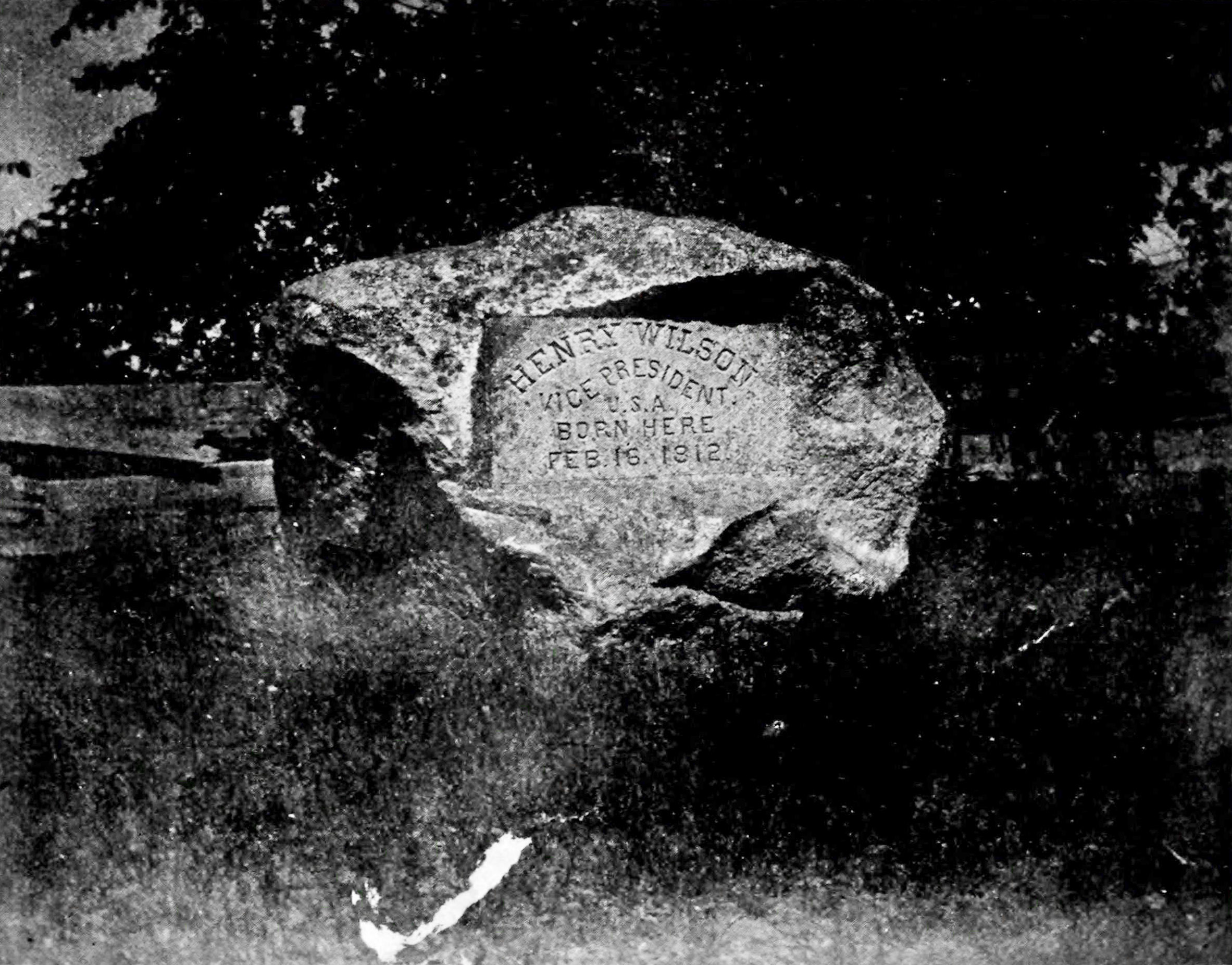The New Hampshire College Monthly
April 1901, Vol. VIII, No. 6, Pages 122-124.

One of New Hampshire's Self-Made Men.
by M. J. White '03
Within the town of Farmington, N. H., and on the top of Peavey hill on the road between Farmington and Rochester, the traveler's attention is drawn to a boulder by the roadside which bears this inscription:
HENRY WILSON
VICE-PRESIDENT
U. S. A.,
BORN HERE,
Feb. 16, 1812.
Eighty-nine years ago a small cottage stood where this boulder now stands and here the early boyhood of Mr. vVilsoll was passed. Before continuing farther it may be of interest to state that Mr. Wilon's real uame was Jeremiah Jones Colbath, but at the age of twenty-one, by act of legislature, he had his name changed to Henry Wilson. This was done by the advice of the family he had lived with, but for what reasoll it is not known. The parents of Mr. Wilson were very poor. His father was a day laborer and his mother was obliged to do washings to help support their large family.
In reference to his early years Mr. Wilson once said in public:
“I was born in poverty; Want sat by the cradle. I know what it is to ask a mother for bread when she has none to give.”
At the age of ten years the future vice-president was apprenticed to a neighboring farmer to live until he became of age. By the terms of indenture he was to have one month's schooling a year, his clothing, and at the expiration of his time was to be given six sheep and a yoke of oxen.
Even when a small boy Mr. Wilson was very fond of reading. In this he was encouraged by a Mrs. Eastman, the wife of a lawyer living in Farmington at that time. She took an interest in the poor boy and loaned him books from her husband's library. As he bad to work hard by day, he had to do all his reading at night and old people of the town tell how, seated in the corner of an old-fashioned fireplace, he used to read until the early morning hours by light furnished from burning pitch-pine knots. In spite of all disadvantages it is said that he had read over a thousand volumes before his apprenticeship was out.
At the expiration of his time he sold his sheep and oxen and walked to Natick, Massachusetts. Here he learned the shoe trade and manufactured shoes for some years; devoting his spare time to the study of law. Too close application to business injured his health, and to regain it his physician advised him to make a journey to the South. Accordingly he went to Maryland.
At Washington he first saw the inhuman slave traffic, His sympathies for the slaves and his indignation against the cruel system were aroused and he told a friend who accompanied him that henceforth the powers which God had given him should be devoted to the destruction of an institution so revolting to every instinct of humanity and so inconsistent with the declaration of our national independence. This furnishes the key to his political career aud by it his public acts must be interpreted:
In 1840 Mr. Wilson was elected representative to the Massachusetts legislature and reelected in 1843. Then he served two terms as state senator. For two years following this he was editor and chief owner of the Boston Republican, a weekly journal and leading organ of the Free Soil party, his political party. In 1853 he was his party's candidate for governor of Massachusetts, but was defeated. In 1855 he was elected United States senator by the American party, succeeding Edward Everett. That year the American party adopted a resolution countenancing slavery. This being against his principles he withdrew and took an active part in forming the Republican party for which he served eighteen years United States senator. In 1861 when the Civil War broke out he recruited the Twenty-second Regiment of Massachusetts Volunteers, and went to war as its colonel. He served on the staff of Gen. George B. McClellan. In 1872 he was elected vice-president of the United States on the ticket with General Grant, but enjoyed this honor but a short time, dying the following year.
No more fitting tribute could be paid to any man than that paid to Mr. Wilson by one of his biographers who said that “during all the years of his public life be stood boldly and unflinchingly for the right and died at the post of duty, as he had always lived, rich alone in his integrity and self-respect, and in the esteem of good men, and the gratitude of the downtrodden and oppressed for whom he had unceasingly labored.”
M. J. WHITE '03
One of New Hampshire's Self-Made Men., by M. J. White, The New Hampshire College Monthly,, April 1901, Vol. VIII, No. 6, Pages 122-124. New Hampshire College of Agriculture and the Mechanic Arts.